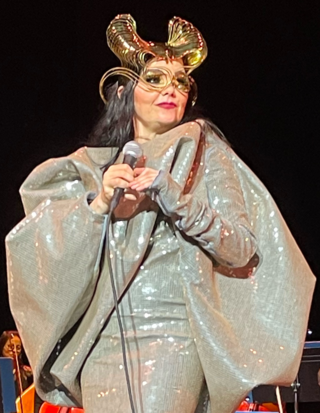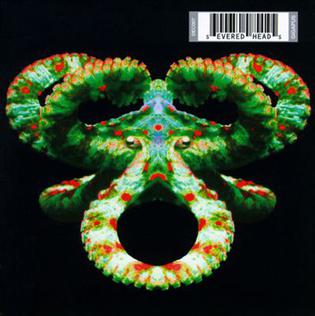
Severed Heads were an Australian electronic music group founded in 1979 as Mr and Mrs No Smoking Sign. The original members were Richard Fielding and Andrew Wright, who were soon joined by Tom Ellard. Fielding and Wright had both left the band by mid-1981 with Ellard remaining the sole consistent member for the rest of the band's existence. Throughout the next decade, several musicians joined Severed Heads' ranks, including Garry Bradbury, Simon Knuckey, Stephen Jones and Paul Deering.

The discography of Icelandic singer-songwriter Björk consists of eleven studio albums, two soundtrack albums, one compilation album, six remix albums, seven live albums, four box sets, three collaboration albums, forty-five singles, ten promotional singles and eight remixes series.

Volition Records was a Sydney, Australia-based record label specialising in electronic music styles such as house, techno, synthpop, and trance. It was founded by Andrew Penhallow and was active from 1984 to around 1997.
The Beloved are a British electronic music group best known for the singles "Sweet Harmony", "The Sun Rising", "Hello", "Your Love Takes Me Higher", and "Satellite".

Technotronic was a Belgian electronic music project formed in 1987 by Jo Bogaert, best known for the 1989 single "Pump Up the Jam", which features vocals by Ya Kid K. The song peaked at number 2 on the Billboard Hot 100 in the United States. Later that year, the single was followed by the album of the same name, which peaked at number 10 on the Billboard 200. They achieved further success with the singles "Get Up! " and "Move This". Technotronic went on to release the albums Body to Body (1991) and Recall (1995).
Boxcar were an Australian electronic dance pop group formed in Brisbane in 1986. Their founding mainstay was David Smith on vocals, guitar and keyboards. Three of their singles appeared on the Billboard dance chart top 20, "Freemason ", "Insect" and "Gas Stop ". They released two albums on Volition Records/Sony Music Australia, Vertigo (1990) and Algorhythm (1994), before disbanding in 1997. They briefly reformed in 2010 and in 2014.
Robert Racic was an Australian DJ and record producer. He was influential within the local electronic and house music circles, but was less well known internationally. Racic produced several top 10 Billboard dance hits including Volition Records' artists Severed Heads' "Greater Reward" and Boxcar's "Freemason", "Insect" and "Gas Stop". He died in 1996, aged 32, of a brain virus, JC virus, which caused progressive multifocal leukoencephalopathy.
Southend is an Australian house-techno band formed in 1992. The group consisted of synthesiser-keyboardists Stuart McCarthy, Steve Younan, Sameer Sen-Gupta, and vocalist Melinda Page. Their single, "The Winner Is...", reached the ARIA Singles Chart Top 10. Sen-Gupta was replaced by Justin Frew on guitar in 1995. The group disbanded in 1997 and reunited in 2003 as a trio, McCarthy, Page, and Younan.
Yazz is a British pop singer, who remains perhaps best known for her 1988 UK number one single "The Only Way Is Up". Some of her records are credited to Yazz and the Plastic Population.
Nightcrawlers is a British-American house music project from Glasgow, Scotland and Chicago, Illinois, assembled by producer, DJ and vocalist John Reid.
Lonnie Gordon is an American female dance, pop and R&B singer and songwriter. She scored several chart hits during the 1990s, most notably for her 1990 UK top 10 single "Happenin' All Over Again".
Freemasons are an English house music duo from Brighton, East Sussex. The act consists of the producers Russell Small and James Wiltshire.
Collette Roberts, who performed mononymously as Collette, is a New Zealand-born, Australian-based model turned disco, pop singer during the late 1980s and early 1990s. She had a top five single on both the Australian and New Zealand singles charts in 1989 with her cover version of Anita Ward's "Ring My Bell". Collette's rendition was certified gold in Australia by ARIA. Sometimes considered a one-hit wonder, Collette had two other top 40 Australian hits in 1989 with "All I Wanna Do Is Dance" and "That's What I Like About You". She retired from her music career in 1995 to focus on her work as a stylist and make-up artist.
Peter "Peewee" Ferris is a DJ from Sydney. Ferris began mixing at an early age, being inspired by his older brothers Stephen and John who are also DJs.
This article has the discography of Jenny Morris, a New Zealand-born, Australian-based singer and songwriter. She has released six studio albums, three video albums and twenty-five singles, in addition to two compilation albums on record labels WEA, EastWest, rooART, Yep! and Liberation Blue.

"Crazy" is a song by the Australian rock/synthpop band Icehouse, from the Man of Colours album, the single peaked at Number 4 on the Australian Kent Music Report. The song was written by band members Iva Davies, Robert Kretschmer and Andy Qunta, and produced by David Lord.
Vision Four 5 was an Australian dance music group whose performances featured interactive video technology. They were formed in 1990 in Brisbane, Queensland with Noel Burgess and fellow students Gavin Sade, Harry Ho and Ben Suthers while studying Music Technology at Queensland Conservatorium Griffith University. The lineup changed through the first few years to settle from 1993-1997 with members Noel Burgess (Music), Tim Gruchy (Video/Interactives), Ben Suthers (Music) and Al Ferguson (Video/Animation).

"Crazy for You" is a song by British pop music trio Let Loose, released in April 1993 by Vertigo Records as their debut single from their self-titled album (1994). The song was written by Richie Wermerling and produced by Nicky Graham. The original 1993 release reached No. 44 in the United Kingdom and debuted at number 157 in Australia.

"Sex Drive" is a song by British band Dead or Alive from their 1995 album Nukleopatra. The single was a minor hit in Australia, where it peaked at No. 52 in March 1997. The song was originally released by Glam in 1994, with Burns as a guest vocalist, but it was re-recorded and remixed for the album.

Gigapus is the tenth studio album by the Australian electronic music group Severed Heads. Recorded between 1992 and 1994, the album was first released in 1994 with a bonus CD-ROM disc titled Metapus that had additional multi-media content on it. Because of this, it is the first album released in Australia to include a CD-ROM disc. Due to the extra disc, the album was initially priced at $40 when it first came out. As with most of the Severed Heads discography, the album has been reissued multiple times.








